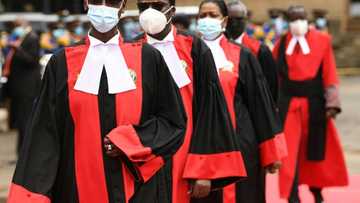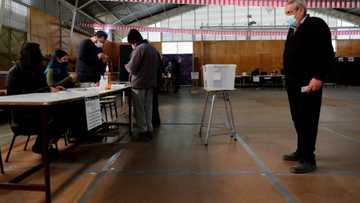Chile rejects draft constitution: five things to know

Source: AFP
PAY ATTENTION: Click “See First” under the “Following” tab to see Legit.ng News on your Facebook News Feed!
Chileans have overwhelmingly rejected a draft constitution that would have replaced the constitution adopted during Augusto Pinochet's dictatorship.
Analysts say some of the proposals it contained were too radical for most voters -- a majority of whom have made it clear they want a new constitution, just not this one.
Here are five things to know about possible factors behind the Sunday vote, in which 61.9 percent of voters rejected the draft constitution:
Drafting disarray
Much of the drafting process was combative, with even the constitutional assembly's opening session marred by protests from its own members.
Several issues had to be shelved, with negotiators unwilling to compromise, and there were numerous verbal assaults.
PAY ATTENTION: Share your outstanding story with our editors! Please reach us through info@corp.legit.ng!
"More than the result of the text itself, what people had been evaluating poorly... was the way this process unfolded," political analyst Marco Moreno of the Central University of Chile told AFP.
Voters were put off by disrespectful behavior and "excesses" on the part of some assembly members, he said.
One member reportedly cast a vote from the shower, for example, while others came to work dressed as the Pokemon character Pikachu or a dinosaur.
Too much, too fast?
Many of the draft's most ground-breaking proposals raised concerns that things may be changing too much, too fast.
"There was certain content... that generated resistance from broad sectors of society and increased levels of fear and uncertainty," said Marcelo Mella, a political scientist at the University of Santiago.
Catholic-majority Chile was deeply divided on draft proposals guaranteeing the right to abortion, declaring access to water and health care as human rights, and specifically recognizing Indigenous rights, which some say undermines the goal of national unity.
"A part of the (draft) constitution is very 'millennial,' and those 'millennial' values are not what the more traditional part (of society) wants," said sociologist Marta Lagos.
Voters were also torn over a proposal to replace the Senate, the upper house of the bicameral Congress, with a so-called Chamber of Regions.
While it would have better represented regional interests, it would have had less power than the existing Senate. Detractors feared this could weaken the opposition's veto powers, leaving too much power in the hands of the president.
Rebuke to the president?
After initial euphoria at left-wing President Gabriel Boric's electoral victory last December, his approval rating recently declined to just 38 percent -- the same as the constitutional "Yes" vote.
Boric, who had promised a rights-driven "welfare state" in place of the neo-liberal status quo, has had to contend with social unrest driven partly by economic hard times, and some have questioned the wisdom of dramatic changes in policy now.
"There is an important protest vote" in the outcome of the constitutional process, said Moreno.
After Sunday's blow, Boric said he would shuffle his government team and host political talks on how best to restart the constitutional process.
Economic role?
After record growth of 11.7 percent in 2021, boosted by early withdrawals from pension funds and state assistance to people contending with the pandemic, the Chilean economy entered a phase of slowdown and high inflation.
"When our country decided to open the constituent process... it did not have the level of economic crisis it has today," said Mella.
"People's risk assessment may have changed, given the dramatic change in economic conditions."
'Spiral of silence'
While the "No" camp had been projected to win, the margin of victory was unexpected.
Analysts point to the so-called "spiral of silence," the phenomenon in which people may hide their opinion on a controversial subject if they perceive they are in a minority, including from pollsters.
The high voter turnout of more than 80 percent -- 13 million out of some 15 million eligible voters -- was unexpected, though participation was technically compulsory.
"Practically everyone who had to vote" did so," said Moreno. "That was not in any analysis."
Source: AFP





